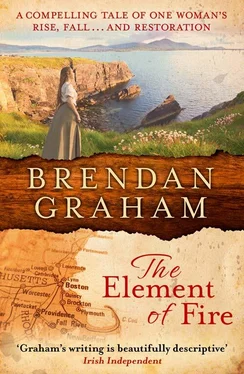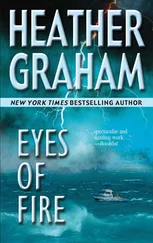A couple of Tipperary lads and me started complaining about what they had promised first when the ganger from Clare says, ‘Well Paddy, start walking!’, and he pointed his finger to the east. ‘You should get there by Christmas!’
It was only June then, so we stayed.
She used it with the children. ‘Life in America is not all honey and gold. Keep to your books, it’s the only way for us Irish to “up” ourselves!’
She herself didn’t come much into contact with the masses of Irish who polluted the neighbourhoods of the North End and Fort Hill, though it was hard to avoid them, the way they spilled over like treacle into the areas around the docks. New vessels, holds bursting with more Irish peasantry, arrived with worrying regularity.
‘The city is swamped with them!’ she said to Lavelle.
‘We’ll all be over-run by the Famine, as much here as at home,’ was his comment. ‘It would never have been let happen in Devon or Cornwall, only in John Bull’s Irish province,’ he added caustically.
She was still careful of the children, and kept them in as much as possible lest they came into contact with the other Irish from the ships, be diseased by these new arrivals. Things had gone well for them and she wanted nothing to go wrong now.
The French wines and brandies supplied to them by Frontignac, Père et Fils, Montréal, found their way steadily off the shelves of Peabody’s two stores – and likewise from the shelves of their newest customer, Higgins of West Roxbury – and on to the finer tables of Boston. There to be frequently served by the swelling number of ‘Bridgets’, who arrived almost daily to inhabit the plush parlours of Roxbury and Beacon Hill.
Once, when visiting Peabody, the merchant had introduced her to one such of his customers. This gentleman, having disposed of the normal courtesies, confided in her: ‘We have one of your countrywomen amongst us – “Bridget” – excellent girl, clean and no trouble; the children adore her.’ Ellen was pleased for him. The gentleman sallied on. ‘She’s the very best “Bridget” in all of Chestnut Street, my wife assures me!’ he said, smiling at her.
‘Really?’ she smiled back.
He, mistaking this for interest, continued. ‘Every home in Boston should have a “Bridget”. They require some training, but are so genial by nature. We hear so much of the turbulence of the Irish character. Perhaps geniality is more particular to Irish womanhood?’ he said, thinking he complimented her.
‘So, they have become nameless?’ she replied brusquely.
He looked at her, surprised at her obvious lack of geniality.
‘If they are all to be called “Bridget”, then they are all without identity,’ she stated, with little patience.
‘Oh, not all, madam!’ the gentleman from Chestnut Street assured her. ‘Our “Bridget” is a Mary, and next door’s is an Ellen; they are all named with their own names, eh, before becoming “Bridgets”,’ he explained, wondering at her slowness, and why on earth Peabody had ever introduced them in the first place.
Whatever about the turmoils Boston was experiencing with Bridgets or otherwise, she and Lavelle settled into a happy and tranquil state. ‘A pool of contentment’, was how Mrs Brophy (‘Wasp-waist’ to Lavelle) described it. Harriet Brophy had an opinion on most things in life – and most people. Furthermore she was not one bit backward about coming forward with these opinions – in whatever company she might find herself.
‘He, Mr Lavelle, is such a dashing man, always good-humoured. It was made in Heaven … made in Heaven, Mrs Lavelle, as my own and …’ she added quickly, ‘… all good marriages most surely are,’ she informed Ellen.
Ellen, was careful not to reveal too much of anything to Harriet Brophy, for by the following Sunday after Mass the whole parish would have it. But ‘Wasp-waist’ was right about her and Lavelle. They were ‘a pool of contentment’. Lavelle was everything the woman described him as and more, being as well an industrious worker and a good father to her children and ‘the fosterling’. Ellen knew he would have liked a child of his own and she was full in her desire to grant him that wish. But so far they had not been blessed.
Lavelle never asked, but every month or so he would look at her. When she said nothing, she would see the hope dashed from his eyes. But it never lasted with him, nor did he ever attach any blame to her, saying only she was the ‘plenty of all happiness’ in his life.
Once she had told him that for the six years before Annie was born, she had been barren.
‘She must have been born hard,’ was all he said, ‘taken a lot out of you.’
Sometimes of an evening he spoke of Australia, its vast bushland, its sounds, its redness. She neither naysayed nor encouraged him in this. Australia had been a dark experience for both of them. But it had, after all, been where she had first met him.
‘You miss it,’ she stated, during one such reminiscing.
‘I suppose I do, Ellen,’ he told her. ‘I grew up on an island, wild as winter. Australia always reminded me of that wildness, though it was hot and red instead of wet and green. I miss the wide-open spaces, the smell of the gum trees – the silence. This Boston’s a noisy place.’
‘It is that,’ she replied.
‘Would you ever return?’ he asked, turning the question on her.
‘No …’ she said, ‘… to neither. Australia is a far country and Ireland even farther in my mind. I’ll do with being buried in America.’
Whatever about dying in America, living in America was an excitement that barely disguised itself. There was always something happening, some new discovery. She followed the newspaper reports of how life was progressing in her adopted homeland as assiduously as ever.
‘See, Lavelle, all we need is a chance! A chance to prove ourselves. We can be as good as the rest!’ she said, reading of how the electric telegraph, developed by two County Monaghan brothers, had carried a message from President Polk throughout the United States. ‘They have five thousand Irish employed and are as well building a railroad across Panama to join the Pacific and the Atlantic oceans!’
Lavelle was not so impressed. ‘And why wouldn’t they, at a dollar a day on the broken backs of their countrymen?’
‘Lavelle, why do you always down your own, those who have advanced in America?’ She was annoyed with him.
‘Because if we don’t say how America was built – at what cost – then it will all soon be forgotten,’ he answered. ‘Forgotten that Paddy’s shovel filled the coffers of this Commonwealth, the same way that Paddy’s green fields filled the granaries of the British Commonwealth. Everything has a price.’
‘At least the Paddies here have a chance, a chance to be part of this Commonwealth,’ she answered him.
‘Commonwealth me arse!’ he said, forgetting himself.
She ignored his outburst. ‘You’re still caught up in the wrongs of Ireland, and all of that … all of what we’ve left behind us,’ she said, calmly.
‘But have we left it behind us, Ellen?’
‘Well, I have,’ she said, more firmly.
Her assiduousness in gleaning every scrap of new information from the periodicals and magazines led her to a most unexpected bounty – Mr Horace Mann, an educator of high standing.
She read how Mann, following travels in Europe, had published a report on a new departure in the education of deaf-mutes, a sort of ‘silent talking’, advocating it be introduced to the schools in America. Her hopes were raised for Louisa and she pursued this new avenue whereby in Germany ‘the deaf can now read on the lips, the words of those who address them, and in turn use vocal speech’.
Читать дальше












